신생아의 소변, Urine of newborn infants
- 출생하기 전 태아 방광 초음파 검사에서 태아의 방광 속에 소변이 차 있는 것을 볼 수 있다.
- 태아가 자궁 내에서 소변을 누는 장면도 초음파 검사에 나타나기도 한다.
- 분만 중 산도 속에서 또는 출생 후 1∼2시간 내에 소변을 보기도 한다.
- 드물게는 출생 후 24시간 경에 소변을 처음 보는 신생아들도 있다.
- 이것도 정상적일 수 있다.
- ([부모도 반의사가 되어야 한다-소아가정간호 백과]-제 10권 소아 비뇨 생식기 질환-소변검사 참조)
- 대부분의 신생아들은 생후 첫 2∼3일 동안 주로 초유만 먹고 성숙 모유를 먹을 수 없다. 또, 인공영양을 먹는 갓 태어난 아기들도 인공영양도 많이 먹지 않는다.
- 이때 탈수가 될 수 있다.
- 이런저런 이유로 이 시기 신생아는 1일 총 30∼60cc 정도 소변을 본다.
- 그 후 대부분의 신생아들은 모유나 인공영양을 충분히 먹을 수 있다.
- 이때부터는 1일 총 소변의 양이 점차 더 증가된다.
- 생후 2∼3일 이후 신생아의 하루 평균 총 소변 양은 100∼300cc 정도이다.
- 신생아들의 크기, 나이, 먹은 모유의 양이나 인공영양의 양, 주위 온도의 차이에 따라 하루 평균 총 소변의 양에 차이가 난다.
- 신생아들의 1일 소변보는 총 횟수는 3~30회 이다.
- 그러나 9~12개월 된 영아들은 1일 4~6회 소변을 본다.
- 신생 남아들이 소변을 볼 때 소변의 줄기가 실과 같이 가늘거나 소변의 줄기가 힘없이 나오거나, 한두 방울씩 똑똑 떨어지면 외 요도구에 이상이 있나, 요로의 어느 부위에 어떤 이상이나 기형이 있나 알아보기 위해 의사에게 바로 문의한다.
- 붉은 혈색 또는 붉은 반점이 기저귀에서 발견될 수 있다. 피가 조금 묻은 것 같은 붉은 기저귀 반점은 요로에서 나온 출혈로 인해 생기든지 소변 속에 있던 요산염으로 생길 수 있다.
- 요산염으로 생긴 붉은 반점은 정상적이고 건강에 무해하다. 걱정할 것 없다.
- 그러나 기저귀에 붉은 반점이 피가 묻어 생긴 것 같으면 의사에게 곧 문의한다.
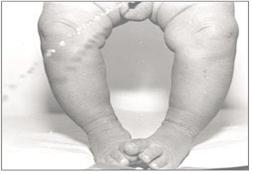
사진 2-114. 신생아가 소변을 본다. 활같이 꾸부러진 생리적 O형 다리를 생리적 내번슬이라고 한다. 이 경우 관찰적 치료만 한다.
Copyright ⓒ 2012 John Sangwon Lee, MD., FAAP
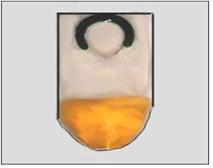
사진 2-115. 소변 검사용 피검물로 신생아들이나 영유아들의 소변을 받을 때 쓸 수 있는 영아 소변 주머니
Copyright ⓒ 2012 John Sangwon Lee, MD., FAAP
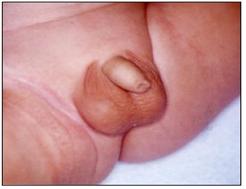
사진 2-116. 신생 남아의 정상 자지와 불알
정상 자지의 크기에 차이가 많다.
Copyright ⓒ 2012 John Sangwon Lee, MD., FAAP
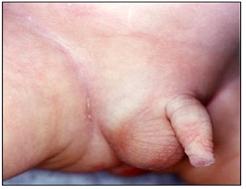
사진 2-117. 신생 남아의 정상 자지와 불알
정상 자지의 크기와 모양에 차이가 많다.
Copyright ⓒ 2012 John Sangwon Lee, MD., FAAP
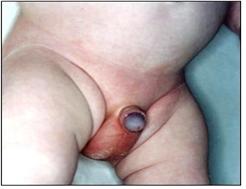
사진 2-118. 포경수술을 받은 신생 남아 정상 자지, 정상 자지의 크기와 모양에 차이가 많다.
Copyright ⓒ 2012 John Sangwon Lee, MD., FAAP
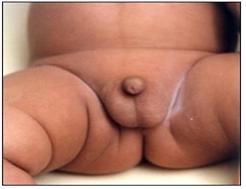
사진 2-119. 신생 남아의 정상 자지
정상 자지의 크기와 모양에 차이가 많다.
Copyright ⓒ 2012 John Sangwon Lee, MD., FAAP
표 2-6. 1일 평균 소변 양
|
1일 평균 소변 량 나 이 |
1일 소변 량 |
| 1~2일 | 15~50cc |
| 3~10일 | 50~300cc |
| 10~60일 | 250~400cc |
| 2~12개월 | 400~500cc |
| 1~3세 | 500~600cc |
| 3~5세 | 600~750cc |
| 5~8세 | 700~1000cc |
| 8~14세 | 700~1500 cc |
표 2-7. 1일 평균 수분 섭취 필요량
|
체중 매 Kg당 평균 수분 섭취 필요 량 나이 |
체중 Kg | 수분 섭취 필요 량 cc/kg |
| 3일 | 3.0 | 80~100 |
| 10일 | 3.2 | 100~150 |
| 3개월 | 5.5 | 140~160 |
| 1세 | 9.5 | 120~140 |
| 6세 | 20.0 | 90~100 |
| 12세 | 38.0 | 60~80 |
| 성인 | 70.0 | 20~40 |
참고: Growth and Development of children George H. Lowrey 8th Edition p.283
The urine of newborn infants
• Prenatal ultrasonography of the fetal bladder may show urine in the fetus’ bladder.
• Scenes of the fetus urinating in the womb may also appear on ultrasound examination
• Newborn may urinate in the birth canal during labor or within 1 to 2 hours after birth.
• Rarely, some newborns urinate for the first time around 24 hours after birth.
• This may also be normal.
• www.drleepediatrics.com- Volume 10 Pediatric Urogenital Disorders – Urine Test)
• Most newborns feed mainly on colostrum during the first two to three days of life and are unable to consume mature breast milk. Also, newborn babies who eat artificial nutrition do not eat much artificial nutrition.
• Newborns may become dehydrated at this time.
• For various reasons, a newborn baby at this time urinates about 30-60cc a day in total.
• After that, most newborns can get enough breast milk or artificial nutrition.
• From this point on, the total amount of urine per day gradually increases.
• After 2~3 days after birth, the average daily total urine volume of newborns is about 100~300cc.
• The average total amount of urine per day varies depending on the size, age, amount of breast milk or artificial nutrition, and the ambient temperature of newborns.
• Newborns urinate 3 to 30 times a day.
• However, infants aged 9 to 12 months urinate 4 to 6 times a day.
• When newborn boys urinate, if the stream of urine is as thin as a thread, the stream of urine comes out weakly, or drips one or two drops at a time, find out if there is an abnormality in the external urethra or any part of the urinary tract. Contact your doctor right away for
• Red spots or red spots may be found on the diaper. Red diaper spots that look like little blood can be caused by bleeding from the urinary tract or from urate in the urine.
• Red spots from urate are normal and harmless to health. No worries.
• However, if your diaper appears to be bloody red, see your doctor right away.

Picture 2-114. Newborns urinate. A physiological O-leg bent like a bow is called a physiological inversion knee. In this case, only observational treatment is performed. Copyright ⓒ 2012 John Sangwon Lee, MD., FAAP

Picture 2-115. Infant urine bag that can be used to collect urine from newborns or infants as a urine test specimen Copyright ⓒ 2012 John Sangwon Lee, MD., FAAP

Picture 2-116. Normal Cocks And Balls Of Newborn Boys There is a lot of difference in the size of a normal penis. Copyright ⓒ 2012 John Sangwon Lee, MD., FAAP

Picture 2-117. Normal Cocks And Balls Of Newborn Boys There are many differences in the size and shape of a normal penis. Copyright ⓒ 2012 John Sangwon Lee, MD., FAAP

Picture 2-118. There are many differences in the size and shape of a normal penis and a normal penis in a circumcised newborn male. Copyright ⓒ 2012 John Sangwon Lee, MD., FAAP

Picture 2-119. Normal Cocks In newborn boys, There are many differences in the size and shape of a normal penis. Copyright ⓒ 2012 John Sangwon Lee, MD., FAAP
Table 2-6. The average amount of urine per day
표 2-6. 1일 평균 소변 양
|
Average daily urine volume age |
Daily urine volume |
| 1~2 days | 15~50cc |
| 3~10 days | 50~300cc |
| 10~60 days | 250~400cc |
| 2~12 months old | 400~500cc |
| 1~3 years old | 500~600cc |
| 3~5 years old | 600~750cc |
| 5~8 years old | 700~1000cc |
| 8~14 years old | 700~1500 cc |
Table 2-7. Average daily water intake requirement
표 2-7. 1일 평균 수분 섭취 필요량
|
Average water per kg of body weight intake required age |
weight Kg | Water intake required cc/kg |
| 3 days | 3.0 | 80~100 |
| 10 days | 3.2 | 100~150 |
| 3 months old | 5.5 | 140~160 |
| 1-year old | 9.5 | 120~140 |
| 6 years old | 20.0 | 90~100 |
| 12 years old | 38.0 | 60~80 |
| adults | 70.0 | 20~40 |
See also: Growth and Development of children George H. Lowrey 8th Edition p.283
출처 및 참조문헌
- www.drleepediatrics.com 제1권 소아청소년 응급 의료
- www.drleepediatrics.com 제2권 소아청소년 예방
- www.drleepediatrics.com 제3권 소아청소년 성장 발육 육아
- www.drleepediatrics.com 제4권 모유,모유수유, 이유
- www.drleepediatrics.com 제5권 인공영양, 우유, 이유식, 비타민, 미네랄, 단백질, 탄수화물, 지방
- www.drleepediatrics.com 제6권 신생아 성장 발육 육아 질병
- www.drleepediatrics.com제7권 소아청소년 감염병
- www.drleepediatrics.com제8권 소아청소년 호흡기 질환
- www.drleepediatrics.com제9권 소아청소년 소화기 질환
- www.drleepediatrics.com제10권. 소아청소년 신장 비뇨 생식기 질환
- www.drleepediatrics.com제11권. 소아청소년 심장 혈관계 질환
- www.drleepediatrics.com제12권. 소아청소년 신경 정신 질환, 행동 수면 문제
- www.drleepediatrics.com제13권. 소아청소년 혈액, 림프, 종양 질환
- www.drleepediatrics.com제14권. 소아청소년 내분비, 유전, 염색체, 대사, 희귀병
- www.drleepediatrics.com제15권. 소아청소년 알레르기, 자가 면역질환
- www.drleepediatrics.com제16권. 소아청소년 정형외과 질환
- www.drleepediatrics.com제17권. 소아청소년 피부 질환
- www.drleepediatrics.com제18권. 소아청소년 이비인후(귀 코 인두 후두) 질환
- www.drleepediatrics.com제19권. 소아청소년 안과 (눈)질환
- www.drleepediatrics.com 제20권 소아청소년 이 (치아)질환
- www.drleepediatrics.com 제21권 소아청소년 가정 학교 간호
- www.drleepediatrics.com 제22권 아들 딸 이렇게 사랑해 키우세요
- www.drleepediatrics.com 제23권 사춘기 아이들의 성장 발육 질병
- www.drleepediatrics.com 제24권 소아청소년 성교육
- www.drleepediatrics.com 제25권 임신, 분만, 출산, 신생아 돌보기
- Red book 29th-31st edition 2021
- Nelson Text Book of Pediatrics 19th- 21st Edition
- The Johns Hopkins Hospital, The Harriet Lane Handbook, 22nd edition
- 응급환자관리 정담미디어
-
소아가정간호백과–부모도 반의사가 되어야 한다, 이상원
-
Neonatal Resuscitation American heart Association
-
Neonatology Jeffrey J.Pomerance, C. Joan Richardson
-
Pediatric Resuscitation Pediatric Clinics of North America, Stephen M. Schexnayder, M.D.
-
Pediatric Critical Care, Pediatric Clinics of North America, James P. Orlowski, M.D.
-
Preparation for Birth. Beverly Savage and Dianna Smith
-
Infectious disease of children, Saul Krugman, Samuel L Katz, Ann A. Gershon, Catherine Wilfert
- 소아과학 대한교과서
- Other
|
Copyright ⓒ 2015 John Sangwon Lee, MD., FAAP 미국 소아과 전문의, 한국 소아청소년과 전문의 이상원 저“부모도 반의사가 되어야 한다”-내용은 여러분들의 의사로부터 얻은 정보와 진료를 대신할 수 없습니다. “The information contained in this publication should not be used as a substitute for the medical care and advice of your doctor. There may be variations in treatment that your doctor may recommend based on individual facts and circumstances. “Parental education is the best medicine.” |